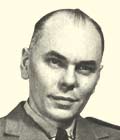
Howard Hathaway Aiken (780 - 850)
American mathematician who invented the Harvard Mark I, precursor of the modern electronic digital computer. Aiken was born on 9 March in Hoboken, NJ, USA.
He attended the University of Wisconsin (Madison) while working as an engineer.
He received his PhD from Harvard University in 1939. He spent a short period of time teaching at the university before being admitted as an employee of the US Navy Board of Ordnance. With the engineers Clair D. Lake, B. M. Durfee and F. E. Hamilton, he immediately began work on an automatic calculating machine that was able to run any sequence of five arithmetic operations (addition, subtraction, multiplication, division and reference to any previous results) without human intervention.
Aiken and his colleagues implemented the first machine, Mark I, on 4 February 1944. It was 15.3 metres long and 2.4 metres high, weighed 32,000 kg and contained about 8,000 metres of cable and more than 3,000 connections. The machine was used directly to solve problems following instructions on punched paper tape. The programmed computer could be operated by people who had received little training.
The Mark I was used by the US Navy for work on artillery and ballistics design.
Aiken completed an improved fully electronic machine called Mark II in 1947.
Aiken received many honours in France, Holland, Belgium and Germany and published numerous papers on switching theory and data processing in electronics journals.
Aiken died on 14 March 1973 in St. Louis, MO, USA.
